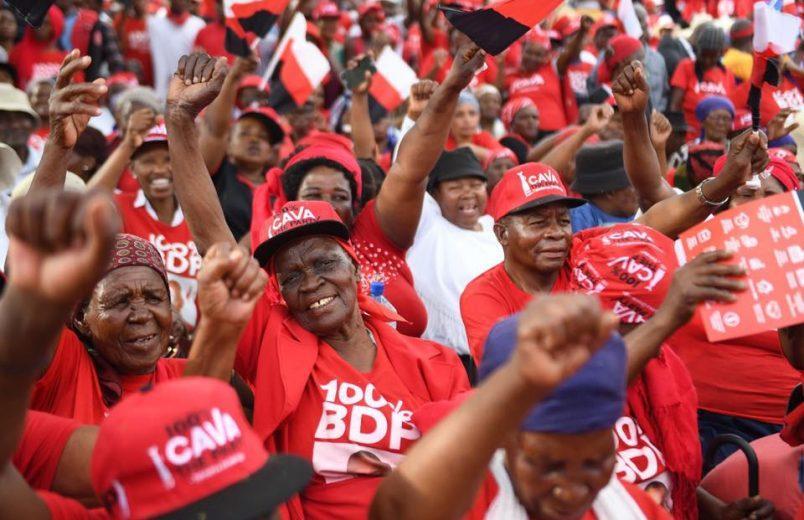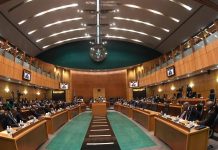Africa-Press – Botswana. The Botswana Democratic Party (BDP) was once the ‘natural party of government’. Now it is not even the natural party of opposition.
Botswana rarely makes international headlines.
It holds regular, peaceful elections, with the BDP all but guaranteed to win almost every time since the first election in 1965.
So, it has been hard not to be taken aback by last week’s sweeping defeat of the BDP, a nationalist centrist independence party that had held onto power for nearly 60 years.
However, the BDP’s impressive track record has been gradually eroding, and the party found itself accused of losing touch with its impoverished constituents in one of the world’s most unequal countries.
ACCOUNTABILITY
Under presidents Ketumile Masire in the 90s and Festus Mogae in the 2000s, Botswana maintained strong macroeconomic policies and a relatively stable economy.
But the BDP failed to establish robust national institutions capable of holding the ruling party accountable.
This concentration of power created a strong authoritarian presidency.
Both Masire and Mogae did not take advantage of this legal loophole.
Under the fourth president, Ian Khama, many institutions weakened further as Khama capitalised on this vulnerability.
His self-appointed vice president learnt from him.
Under president Mokgweetsi Masisi, the BDP turned on national institutions and on itself.
Masisi publicly humiliated those who held opposing views and used the rogue secret service, the Directorate of Intelligence Services (DIS), to punish his political foes.
So, for Botswana watchers, it was not entirely unexpected that the opposition coalition, the Umbrella for Democratic Change (UDC) under Harvard-educated constitutional lawyer Duma Boko, was able to stage an impassioned takeover.
A FAMILY AFFAIR
The party’s complacency alienated voters who, on 30 October, used their ballots to protest the rampant corruption.
Masisi’s family members, with no relevant expertise, were embroiled in court battles over state tenders, according to former BDP executive secretary Botsalo Ntuane.
With a declining mineral-based economy, some members of Masisi’s family found a lucrative niche as rent-seekers for foreign companies in a sprawling corruption enterprise that nearly turned Botswana into a kleptocracy.
Masisi also failed to diversify the economy away from mining, particularly diamonds.
BALLOT BOX BACKLASH
The collapse of the BDP’s parliamentary presence is astonishing: It plunged from 65% to a mere 6%.
Outside Botswana, this defeat will likely serve as a cautionary tale for other parties and governments.
The election centred on issues that directly affected people’s lives.
Botswana’s economy remains undiversified, with unemployment at 27% and widespread corruption fuelling a disconnect between the party’s actions and the public’s struggles.
Factional infighting within the BDP continued unchecked, and Masisi’s Achilles’ heel proved to be his failure to present a unifying vision that could inspire hope for Botswana’s future.
Voters punished the BDP for poor governance and dismal service delivery, especially in the public health and education sectors.
They were also frustrated by blatant nepotism and regionalism, where appointments to senior government positions and diplomatic roles favoured regional ties over merit.
ENEMIES AND EXTRAVAGANCES
In many instances, innocent citizens, such as former intelligence officer Welheminah Maswabi, endured egregious persecution.
She was accused of embezzling more than US$7 billion through offshore accounts – a fabricated story dismissed by the central bank.
Many Batswana, including some within the BDP, yearned for genuine freedoms and an end to the menacing presence of the intelligence and security directorate, a rogue agency operating beyond its mandate.
Ambitious party members who sought leadership roles were often sidelined, and Masisi’s relationship with controversial leaders – such as Zimbabwe’s president Emmerson Mnangagwa (of Zanu-PF) – raised eyebrows.
Masisi joined the ranks of Africa’s ‘flying presidents’, spending 30 million pula on international trips in 2023.
His penchant for extravagant spending on vanity projects appeared boundless.
‘GEM OF A DEAL’
However, it was the fallout with De Beers that sparked an immediate backlash against the BDP and Masisi.
Botswana is the world’s top producer of diamonds by value, and the government owns a 15% stake in De Beers, part of Anglo American.
Last year, Masisi negotiated a larger share of the country’s rough diamonds with the company.
While the negotiation was a welcome development, Masisi politicised the private diamond deal with De Beers, using it as campaign rhetoric to belittle the mining giant.
“I am not scared,” he said, on the campaign trail.
“Yes, we are politicians and always lobby for votes, but if it means losing as a result of this issue, let it be.”
SUPREME LEADER
Voters also disapproved of the Independent Electoral Commission’s ‘benchmarking’ visit to Zimbabwe’s controversial electoral body, ZEC.
This year, a downturn in the global diamond market led to economic growth plummeting to a projected 1%, while unemployment climbed to 28%.
The BDP, meanwhile, had become progressively de-institutionalised, morphing into a cult-like entity.
Key party events, such as the national council and congress, were either cancelled or condensed into single-day affairs.
It was rumoured that the central committee met only when convenient for the president.
• Joel Konopo is an investigative data journalist based in Botswana. He is the managing partner at INK Centre for Investigative Journalism, a non-profit public interest investigative journalism newsroom.
tha nambian
For More News And Analysis About Botswana Follow Africa-Press






